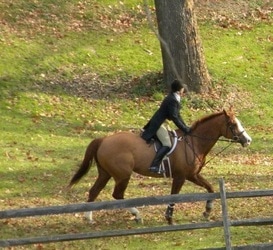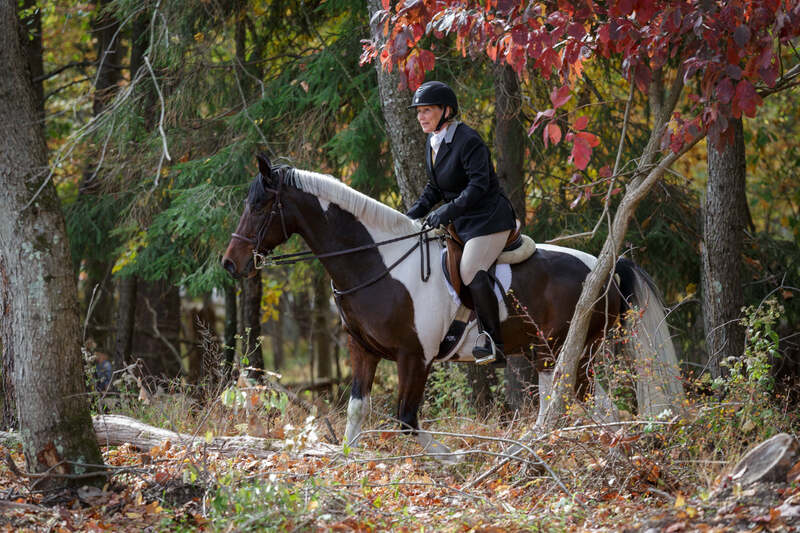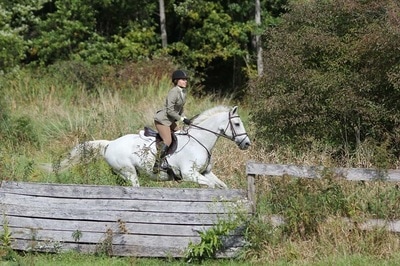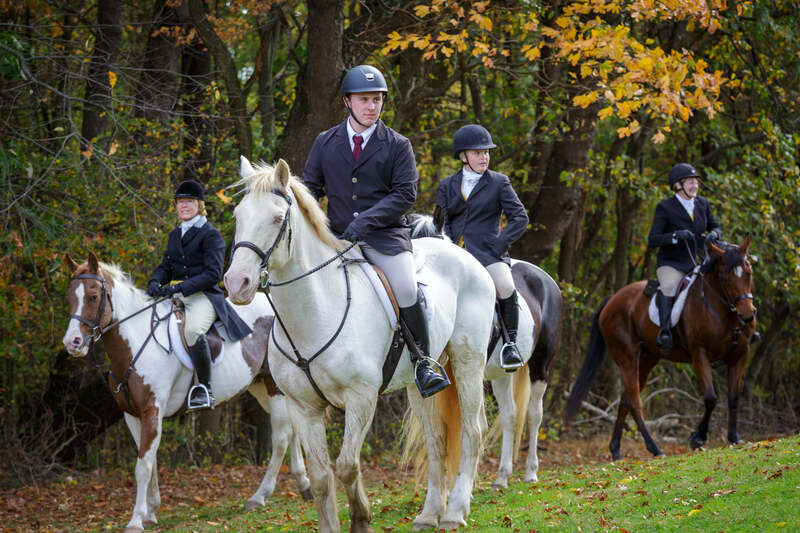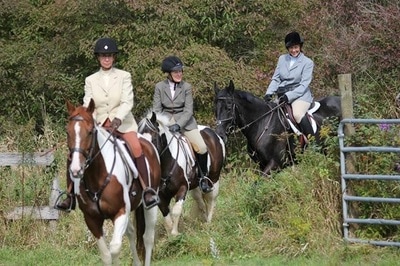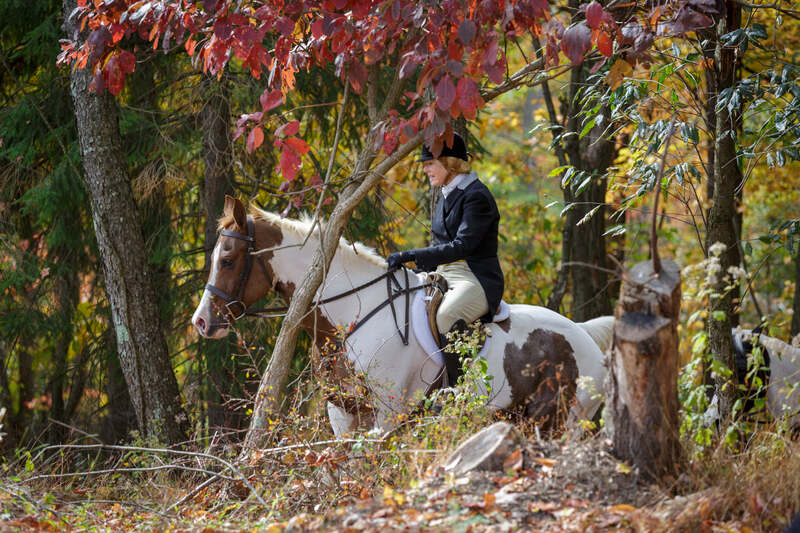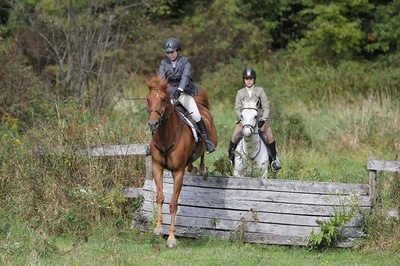Showing good sport...is the prime objective of the Masters and the Staff-Huntsman, Field Master, Whippers-in, and Honorary Secretary. To achieve this, certain conduct is required. While promoting good sport, it is also their desire to encourage caution as it is necessary to ensure the safety of riders and mounts. At the sound of the horn, when Staff brings hounds up from the kennel, please face the pack and be quiet. Give the pack and the Staff the respect they are due. If you are ever in doubt about protocol always feel free to ask a member of the staff.
|
Respect for Masters and Staff
- The Field Master represents the authority of the MFH. Follow his instructions. Listen carefully for his announcements. Observe proper respect for seniority. There are members in the field who have been awarded colors which should be properly honored.
- Arrive at the meet correctly attired and tacked in sufficient time to be mounted at the appointed hour.
- Upon arriving at the meet, present your guests to the Honorary Secretary and take care of payment of fees.
- Position yourself comfortable in the Field. Riding alongside the Field Master or "in his pocket" is appropriate only by invitation. Speak very softly and do not address the Field as a group. NO SMOKING at any time.
- Be careful of our hounds. Always turn your horse's head toward the pack at all times. Ride wide of hounds. DO NOT SPEAK TO HOUNDS unless specifically requested to by the Staff.
- Keep up close to the Field. Do not straggle or wander off. This is particularly critical when going through gates. Always excuse yourself from the Field Master before leaving the Field. He can show you the way home and/or possible prevent your "heading a fox."
- Do not take shortcuts - follow the track of the Field. This will prevent overrunning hounds or other riders or the encounter of unexpected hazards.
- Always thank the Field Master, the Master, the Huntsman and the Staff at the end of the day.
Respect of the Field
- Maintain a safe interval between your horse and other riders at all times. Do not cross jumps, jump unnecessarily, or cross in front of others. Ride straight and collected at all jumps. If your horse has a refusal, go immediately to the rear of the line. Never try again and again while others are waiting their turn.
- If your horse cannot get over on the third try, look for a gate. It will probably be faster and safer for your horse and yourself.
- On narrow trails, try to leave safe distances between mounts. While climbing steep hills do not stop and obstruct the path of horses behind you. After you reach the top, clear the area as soon as possible.
- It is assumed that each rider is a capable horseman and has a mount that is manageable. Do not bring problem horses into the Field.
- If your horse is a kicker, tie a red ribbon on his tail and ride him at the extreme end of the Field to avoid accidents. A red ribbon is not a license to bring a disobedient horse in the company with others.
- Try to warn riders following you of dangerous obstacles in the Field, such as holes, wire, etc. As you come alongside it, pass the word back, pointing to the location and saying "ware hole", "ware wire", etc.
- When you hear "Hold Hard", stop where you are. Do not move. Stand still and be quiet. This is not the time to catch up or a period of discussion.
- An upraised hand is the signal for slowing or stopping. As soon as this signal is given rider should give the sign to prevent the rear riders from piling up.
- If it appears that you are on the line, stay exactly where you are. Hounds will work the Field and even the horse's legs.
- Hounds are vital to sport. Learn to take interest in their work.
- Radios and cell phones do distract hounds, Staff, and riders who are trying to listen to the day's sport. Normally members of the field do not carry radios except with special permission.
"Foxhunting provides those fleeting moments of total abandonment - of wind-in-your-hair, bugs-in-your-teeth kind of living. At its best, it is totally out of control. Hounds are screaming, hooves are thundering, the horn is blasting as you race and jump across country to die for, often in weather not fit for man or beast. It is the original extreme sport and the sport of country people from every generation since the beginning of time.”
- Excerpt from the book "Whipper-in", by Dennis J. Foster
General Rules and Protocol
Rules in the hunt are applied common sense and polite behavior. Most people who break them do so either through ignorance or lack of courtesy. Primary consideration goes to hounds, landowners, staff, fellow riders, and your horse.
- Never do anything that might harm a hound. Do not jump a fence before all hounds are clear. Turn your horse's head toward passing hounds to prevent kicking one.
- Never damage a landowner's property or allow their livestock to escape. It is much better if you are left behind than a landowner to be annoyed.
- The Hunt has permission to rider over certain terrain - you as an individual do not. Respect this by not hacking over country without permission even though you may have hunted there only yesterday.
- Stay to the edges of fields. Avoid unharvested crops. Do not take shortcuts. Follow the Field Master, thus preventing overrunning the scent or damaging landowner's property.
- Do not pass the Field Master. Do not even come alongside him without his invitation.
- "Staff, Please" requires your immediate yielding of the right away to the Huntsman or Whipper-in. Back your horse off the trail with his head to the passer-by and remain until the staff member has passed.
- "Hunt, Please" is the signal for each member of the Field to allow any staff, hounds, and those previously ahead of you to pass. Then fall back into line. Each hunt component thereby retains its position.
- "Reverse" in the event of a reverse we use a "Moving Reverse" each rider continues to move forward until they reach the point the Field Master turned around. This creates two-way traffic, insures that horses remain calm, and everyone retains their position.
- When a warning ("ware wire" or "ware hole" etc) is passed back, it should be in voice suitable to carry to the next riders following only. Watch for the hazard and as you pass it, pass the warning and point to the hazard.
- Total attention to the Hunt is your reason for coming. Conversation while hunting should be limited.
- Hold Hard, signaled by a vertically raised forearm, requires that you stop where you are, standing still and quietly. Raise your own arm while stopping to alert riders behind you.
- Any time the Hunt halts, you should be alert for a possible Reverse signal.
- Do not crowd the horse ahead of you. It is neither polite or safe. It may result in a kick. Horses which are known to kick on provocation wear a red ribbon in their tails. A rider with his arm held horizontally behind his back is warning you that his horse is so annoyed.
- Do not lag behind. If you wish to leave the Field, ask permission of the Field Master.
- If a rider has trouble, the nearest rider should lend assistance while the rest of the Field continues.
- The "last man" has the responsibility of closing any gate or raising any bar that might have been let down. The nearest person should wait and assist him.
- Riders having difficulty with their horses should stay to the rear. If your ineptness or your mount's misbehavior interferes or slows the rest of the Field, ask permission to return to the Stables. This courtesy to the other riders also saves you the embarrassment of being asked to leave.
- At jumps, form a distinct line and jump in that order. Do not cut in front of another rider. Make use of multiple panels for jumping if available.
- If your horse refuses to jump an obstacle, go to the rear of the line before making another try.
